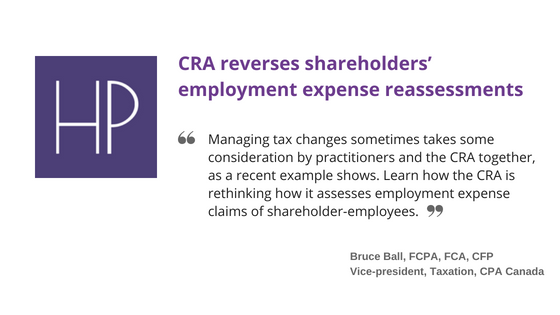Managing tax changes sometimes takes some consideration by practitioners and the CRA together, as a recent example shows. Learn how the CRA is rethinking how it assesses employment expense claims of shareholder-employees.
In the fall of 2017 and early 2018, Canada Revenue Agency (CRA) issued a series of reassessments that denied the claims of shareholder-employees who listed automobile and other costs as “other employment expenses” on T1 tax returns. It appeared that the CRA was following the rationale used in an informal Tax Court of Canada decision from 2009. In the Adler case, the court held that an owner-manager who controls a corporation cannot be required to travel by the corporation they control. Therefore, their expenses could not be deducted as employment expenses.
However, CPA Canada pointed out that on the CRA’s website, tax return guides and forms do not state this view on the non-deductibility of shareholder-employee expenses. As a result, it seemed that the CRA was effectively applying a change in an assessing practice retroactively.
Following its own review, the CRA concluded that more consultation and new guidance is needed on this assessing practice. In a notice to stakeholders on the topic, the CRA acknowledged the importance of ensuring that Canada’s self-assessment tax system is supported with clear guidelines for taxpayers and their representatives. We applaud the CRA for having another look at the issue from the taxpayer’s perspective.
To address the current situation, the CRA says it will:
- stop reviewing and disallowing “other employment expenses” claimed by shareholder-employees on line 229 of the T1 Individual Income Tax and Benefits Return
- reverse reassessments that were issued under the new assessment practice from September 1, 2017 to February 10, 2018 (with no action needed by taxpayers and their representatives)
- contact the taxpayers involved in these reviews by letter to inform them of this decision
- inform tax practitioners through stakeholder contacts and targeted communications
Looking ahead, the CRA will consult with the tax community to clarify the requirements for deducting the employment expenses of shareholder-employees, and how the expenses should be claimed. The CRA expects to issue a clarification that would take effect for the 2019 tax year, supported by guidance published in advance of any future reviews of these claims.
The CRA’s assessment and verification processes are important for maintaining the integrity of, and Canadians’ confidence in, Canada’s tax system. CPA Canada looks forward to continue working with the CRA to ensure its assessing practices and any changes are communicated to taxpayers and their representatives in a clear and timely way.
KEEP THE CONVERSATION GOING
If you have experience with the CRA’s reassessments of shareholder-employees’ expenses, I’d like to hear from you. More broadly, tell us your ideas for making Canada’s tax system simpler and more efficient for taxpayers, practitioners and the CRA alike.
CPA Canada’s Tax Blog is designed to create an exchange of ideas on tax policy and practice issues, and their impact on those who practise tax. Your comments can provide helpful input into the public interest advocacy positions developed by CPA Canada.
Disclaimer
The views and opinions expressed in this article are those of the author and do not necessarily reflect that of CPA Canada.
Bruce Ball, FCPA, FCA, CFP
Vice-president, Taxation, CPA Canada

